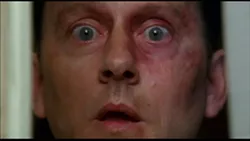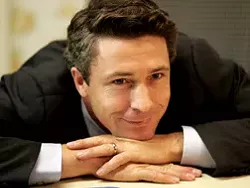Slow, realistic character development is one thing that serialized televisioncan do better than almost any other medium. Plays and movies are too short — you only get the Cliff Notes version of their arc. A novel can describe a way a characterchanges, but it can't truly show it: It can only signify physicaldifferences, while actors can actually show what the transformation looks like visually.
Of course, television is full of awful character development, whereinteresting multi-dimensional characters turn into obnoxious one-sided ones. Thewisecracking villain turns into awhiny, castrated creepy love interest. The kind Christian neighbor turns intoa raving fundamentalist.
But here, I've collected five examples — no more than one per series — of thebest character transformations on television. Extreme spoilers ahead.
(You may complain about the lack of females. Well, TV writers, most of who are men, need to write better female character arcs.)
Hank Schrader – Breaking Bad
From swaggering to stumbling
"Asshole macho cop" isn't exactly a unique character type. And that's what Hank was in his first season. He was simply a way to emasculate the main character (his chemistry teacher brother, Walter White) and not much more. But a turtle changed all that.
On assignment with the DEA, Hank runs across the severed head of an informantstuck to a turtle. He leaves to vomit, the rest of his team is blown up by C4 charge. From there,Hank's fear cracks through his swagger. His obsession with catching this mysterious meth dealer becomes less about doing his job and more about avoiding his responsibility, about reclaiming his masculinity. When an attempted assassination temporarily deprives him of his ability to walk,Hank grows even more complicated — a mix of frustration, obsession, despair, inadequacy and anger. It's only a matter of time before he discovers his brother is the meth mastermind. When that happens, expect Hank's character to become even more interesting.
Wesley Wyndam-Pryce — Buffy the Vampire Slayer/Angel
From poncey British klutz to bitter badass
For years, on Buffy the Vampire Slayer and spinoff Angel, Wesley was a dope. Even his name, "Wesley Wyndam-Pryce," alludes to his character, a bumbling, naïve Brit more Wooster than Jeeves. Here'show he's described in the script for the first episode he appears in: "Young, not bad looking, but a bit full of himself. Thinks he's Sean Connery when he's pretty much George Lazenby." He was supposed to be killed off a few episodes in, but the writers took a liking to his "curious humour."
So we laugh when, in the first season of Angel, the motorcycle-driving, leather-jacket clad "Rogue Demon Hunter" rolling into town, turns out to be just goofy ol' incompetent Wesley.
But TV characters, even disposable ones, can change dramatically. Events change people. Like unrequited love. Like being compelled to do horrible things for the greater good. Like having your friends abandon you. Like being tortured by your former pupil. Like getting your throat cut. Over around 125 episodes, he morphs from pompously silly to determined to frustrated to obsessive to bitter to frightening to self-destructive to, finally, redeemed.
Four seasons in, and this former by-the-book brown-noser is having sex with one villainous woman, and holding another woman prisoner in a closet with only a bucket for a toilet. Then, famously, he threatens to take away her bucket.
From there it's all gravely voices and trench-coats and dual-wielded pistols. The demon hunter, now a credible threat to even the biggest baddie, went rogue. He learns to control his darker side, but the scars — on his soul and his throat — remain.
Over six years he appeared on Buffy and Angel, he transforms from the series' lightest comic relief to its darkest avatar of despair. In a way, Wesley's arc is the summation of the point of the series – recognizing that the fight against evil is brutal, painful and truly hopeless. And that's why you should fight anyway.
Benjamin Linus – Lost
From puppeteer to puppet
Benjamin Linus, could have had an awful character arc. Whenever you seek to humanize a villain, you risk defanging him, making him a less interesting character. Thanks in large part to Emerson's eerie performance, that never happened. At first Ben was a master of manipulation. He was Lost's Iago, able to cause chaos and destruction with just a few key choice words.
But as he's brought into the fold of the Lost survivors, as his allies are decimated, we begin to see his other side: The deep insecurity that drives him. The fact that he doesn't really have a plan, that he — like theLost viewers — just has faith in vague powers that he doesn't really understand. By the final season, he's being manipulated, pathetically, by some of the same people that he used to control. Ben loses his mojo, but in doing so his character gained all the more depth. Sawyer had a subtler character arc, sure. But Ben's was far more fascinating.
Tommy Carcetti – The Wire
From idealist to narcissist
For most of the characters in The Wire, their cynicism and idealism was one side of a Mobius strip. Our "heroes" cloaked the good they did in sneers and smirks and eye-rolls, while the "villains" clearly laid out the pragmatic, practical reasons for murders and such. It's all in the game, yo.
But mayoral candidate Tommy Carcetti, fresh-faced, passionate, bubbling with charisma, looked to be different. Enough, he said from his campaign lectern. Enough with juking the stats, enough with the city's decay, enough with corrupt bureaucrats! He was hope wrapped in change wrapped in a charming smile. Besides being unfaithful to his wife (no big deal for the Wire) he seemed the exception to the rule. In keeping with The Wire's skepticism, you'd expect him to lose, to be defeated by the institution, by the cynics and hacks.
Instead, something worse happened: Carcetti won. He brought his rhetoric to bear on the city's problems … but then, he too was co-opted in a way, trading away money to rebuild Baltimore for a chance to run for governor. Here, The Wire, so much about the destructive nature of systems instead of personalities, veered differently with Carcetti's character's development. The city of Baltimore was seduced by Carcetti's charisma — and so was he. Carcetti began to believe that Carcetti could solve everything if Carcetti could only rise high enough. His ambition became a means to, well, further ambition.
Did he ever truly believe his rhetoric? We never find out.
Through Carcetti's character development we see a more interesting interpretation of cynicism in The Wire's thesis. Sometimes idealistic goals aren't crushed by bureaucrats or bullets. They're discarded, exchanged for shinier pursuits.
The other employees — The Office
From extras to show-stealers
One of the best innovations of The Office: With a few exceptions (Jenna Fischer, say) the cast isn't very attractive. They look like average people who work in average offices. Some of them — Toby, Ryan — are actually writers on the show. Phyllis was actually a casting agent before she was brought onto the show. And for the first season, that's all they were: signifiers of the drudgery of an office. The show was about Jim and Pam, Dwight and Michael.
But when the second season opened, they began to do something the British version never did: give the rest of the cast personality. So when Jim and Pam's relationship became dishwater-dull, when Michael and Dwight became unrealistically cartoony, the show survived because of the rest of the cast. We could always count on Kevin's dopey smile, Oscar's arrogant insistence on minutia, Stanley's frustrated aloofness, Angela's simmering repressed anger, Phyllis's sweetness, Ryan's new-media idiocy, Kelly's perky passion for celebrity gossip, or Creed's frightening non-sequiturs. Too many sitcoms focus on their core cast. But, in comedy, the great development happens on the edges.That's where investment in a true ensemble happens. A good thing too, considering their big star is leaving.





